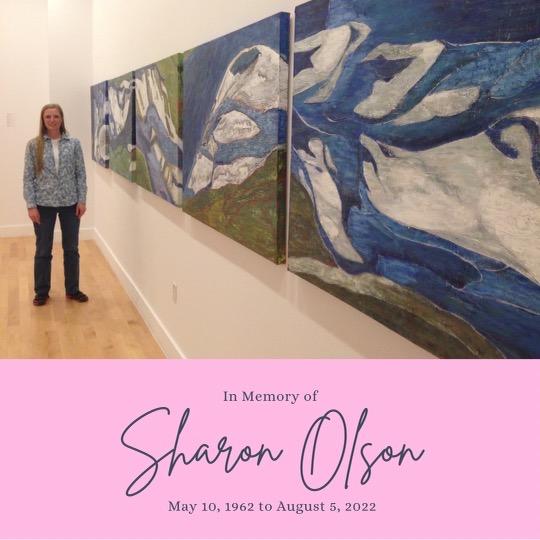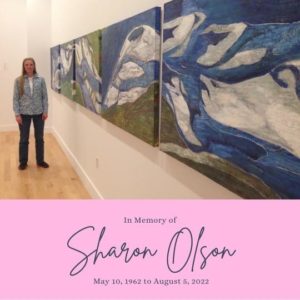In Memory of Sharon Olson

Presented to Saskatchewan government April 4, 2023 by Sharon’s sister Marjorie Olson.
Sharon Olson was born May 10, 1962 and died August 5, 2022. She was Lois and Roland Olson’s daughter, sister to three brothers and three sisters.
When Sharon found a lump in her armpit in 2017, her doctor sent her for a mammogram which found nothing. In fact, the mammogram report stated that her breasts were extremely dense; there was no evidence of malignancy; there was no change compared to her mammogram from 2013; and the mammogram was “grossly unremarkable.”
Density was not something that Sharon had heard of before. She did not know that it could hide cancer in a mammogram and that it increased her risk of breast cancer. If she had known about the risks of dense breasts she could have advocated for an ultrasound in those years when the cancer was starting and before it spread to her lymph nodes.
The subsequent ultrasound the same day as her mammogram found a large tumor in her left breast and cancer in her lymph nodes.
Biopsies, bone scans, MRI, CT scan soon filled her schedule. Chemo, radiation, and surgery became hurdles to overcome and overcome them she did.
Because of the demands of her profession as a teacher, Sharon knew she couldn’t continue and took sick leave during her treatments and then retired after 28 years of teaching.
And so, life resumed. She moved to Weyburn to be near her parents to help and be helped. She bought a house with a dream art studio in it so she could paint. Her large canvases of the South Saskatchewan River from space were held in awe by her nieces and nephews, and her time was filled with taking courses from the University of Saskatchewan, encouraging and being encouraged by her church family, studying the stars and the planets in the sky, and watching tennis.
But her most enduring task was to know and promote and inform of the dangers of dense breasts. She hadn’t known. She didn’t want others to be in the same position as she had been. Her posts on Facebook oSen asked, “Do you know if you are dense?”
Sharon familiarized herself with the lack of direction from the Canadian Task Force of Preventive Healthcare who didn’t advise warning women of their density or recommend ultrasounds unless there was a suspicion of cancer on the off chance it could cause anxiety. This made her angry; how could a week or two of anxiety could possibly compare to 64 plus weeks of treatment and then in the end, death. How could a Task Force override her right to be informed so she could take preventive action?
In February of 2022, Sharon contracted Covid 19 and her health suffered. Excruciating pain in her back and hips sent her to the hospital many times where she was given prescriptions for pain medication. The thought occurred to us that maybe the cancer had metastasized to her bones and in search of help she travelled to Regina General Hospital where she sat in Emergency for 48 hours before she was moved to a room.
After many tests and scans which could not pinpoint the cause of her pain, a scan was done of her head and there it was, a tumour that caused brain tissue to be squeezed out of the way with the associated inflammation. We all hoped that surgery to remove the tumour would relieve her worst pain symptoms, but it did not.
Sharon was having mobility issues causing her legs to spasm leading to falls and because of this it was evident to her oncologist that the breast cancer that had metastasized to her brain had spread beyond the tumour to the lining around her brain and spinal column and that further treatment, although not denied, could not be counted on to help. Plans were made for end-of-life care and her family gathered in love and support during the most painful time.
Sharon’s deepest hurt was the delay in providing necessary information about breast cancer to all so that they would know the true risks to their health and what to do about it.
In the past, I’ve received those letters from the Screening Program for Breast Cancer, and I am grateful
for the program as I am sure it has helped many. I was told I have dense breasts but not what that
meant – not a hint of the heightened risk nor a link to an informational website. I also could have had mammograms that were “grossly unremarkable” that let me think that I was fine. The wording is now more strongly worded, but it is still easy to overlook when one doesn’t have the understanding. I realize that we need to be our own advocates, but we cannot advocate for something we don’t know. And people’s doctors (if indeed they have primary care physicians) cannot advocate for their patients if they are not informed of the risks their patients with dense breast face or understand the necessary screening that needs to be done.
And that was what Sharon wanted – for women to know their risks and in that she succeeded because information will be provided to women with dense breasts in the fall of 2023.
But that is not enough because the government must allow the best decisions for screening:
– to start screening at 40 years of age;
– to advise every person of their breast density and how their density affects their risk so they, too, can share the knowledge;
– what a mammogram can and cannot show;
– and to include annual screening ultrasounds in addition to mammograms for people with dense breasts.
With your help our family knows that Sharon’s hope will come true; that every person in Saskatchewan will be given every chance to find cancer early.
Thank you.

